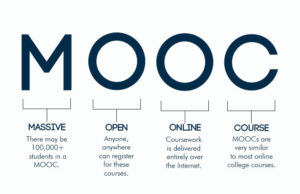First of all, I wanted to use some open-source programmes to do the video, I was playing a little with OpenShot and Kazam, sadly my laptop died finally this week, and I needed to find other ways to record last minute. You will see in the video that appears the name of my husband… Long story short, I used his work laptop and an internal tool to record and his name is everywhere… sorry about.

Find here the summary of the main ideas of the video, and the questions I wanted to raise. I know that 16 minutes of a not very fluid video are difficult to swallow 🙂
Structure, design elements:
- It has all the ingredients you can expect from a MOOC
- Overall, the platform has all the requisites to make good usability, even though I found some elements that bothered me. Constant notifications are visible that I am not able to close.
- It has a free and certification option, but I am disappointed by the fact that audit access expires. When I enrol to a MOOC is because I want to check the information, and kind of keep it, like a book, something that is in my “virtual library” and I am able to check it when needed.
- Content is correct, there is a clear lineal structure and video content is clear enough.
- I am missing more clear objectives and information about the topics that you will be focused on during the course.
- Information about the teacher and staff + Requirements of the programme, very helpful before enrolling to the course.
Thoughts and questions:
- What is the framework that institutions work with?
- Different institutions have access to different frameworks? more resources are given by the platform?
- Is the data collected really useful and used to design and create the course?
- By definition MOOCs has a massive audience, building a community and social network is not something expected, isn’t it? This probably clashed with part of the philosophy behind “open”.
- How and Who is marking the quality baseline? in big platforms like edX or Coursera, are the courses being tested/rated by someone before going online?
- Ideas of why people enrol to a MOOC: have access to resources, information and materials? curiosity?, check options to find areas of interest?, first step to making a career change, find a community?
- Value of the programme. In order to get a certification sometimes is enough paying by the course. There a diverse kind of evaluations, some courses offer a better way to check progress. True/False or more complex questionaries, Peer review or just click to checkmark. How can we be sure that someone that has taken the course has the knowledge? Is the credibility of the platform enough?
On the other hand, I found the post I wrote last year when I was attempting to do the course for the first time. Find the text here, in case you are interested, I realise now it was not a deep analysis…
Knox, J. (2013). The limitations of access alone: moving towards open processes in education. Open Praxis, 5(1), pp. 21-29.


‘Long story short, I used his work laptop and an internal tool to record and his name is everywhere… sorry about.’
No need to apologise – nice workaround 😉
Really nice work, Lidia. Great to see you exploring another medium to share your work, and very effectively done.
That’s an interesting point you raise about the persistent nature of the ‘upgrade to certificate’ window, and that it doesn’t seem to align with the non-profit nature of edX. This made me wonder whether it affected how you perceived the MOOC itself? Do we become less inclined towards a resource like this when we seeing it being monetised against our expectations?
And related to the above point, did your experience become at all undermined at the point that you were asked to share data? Like you, I was asking ‘why is this information needed?’ and ‘If you are not persuasively explaining why you need this data, what do you intend doing with it?’ This isn’t to say that edX would have plans to do anything problematic with the data, however when we are increasingly concerned about data breaches and how our data can be sold, it does seem to put pressure on an organisation to be really clear about why they are asking for than kind of information.
I was also interested in your discussion about creating a profile and that you were not interested in joining a learner community. Do you think this comes from having completed these kinds of courses before, where you begin to get a sense of what you can draw from them? One of the criticisms I have heard some previous IDEL students make of MOOCS is this absence of interaction and community, which perhaps makes me wonder whether that’s a case of bringing expectations from more conventional education into the MOOC space, which might then fade over time as one becomes oriented to what can be achieved in that kind of space?
Towards the end of your discussion you make the point that, seeing as it is free, this is a good MOOC (and forgive me for paraphrasing here). This made me wonder whether in the MOOC space we immediately temper our expectations a little, compared with courses we pay for?
Thanks for all your work across this week, Lidia. You’ve earned a badge!